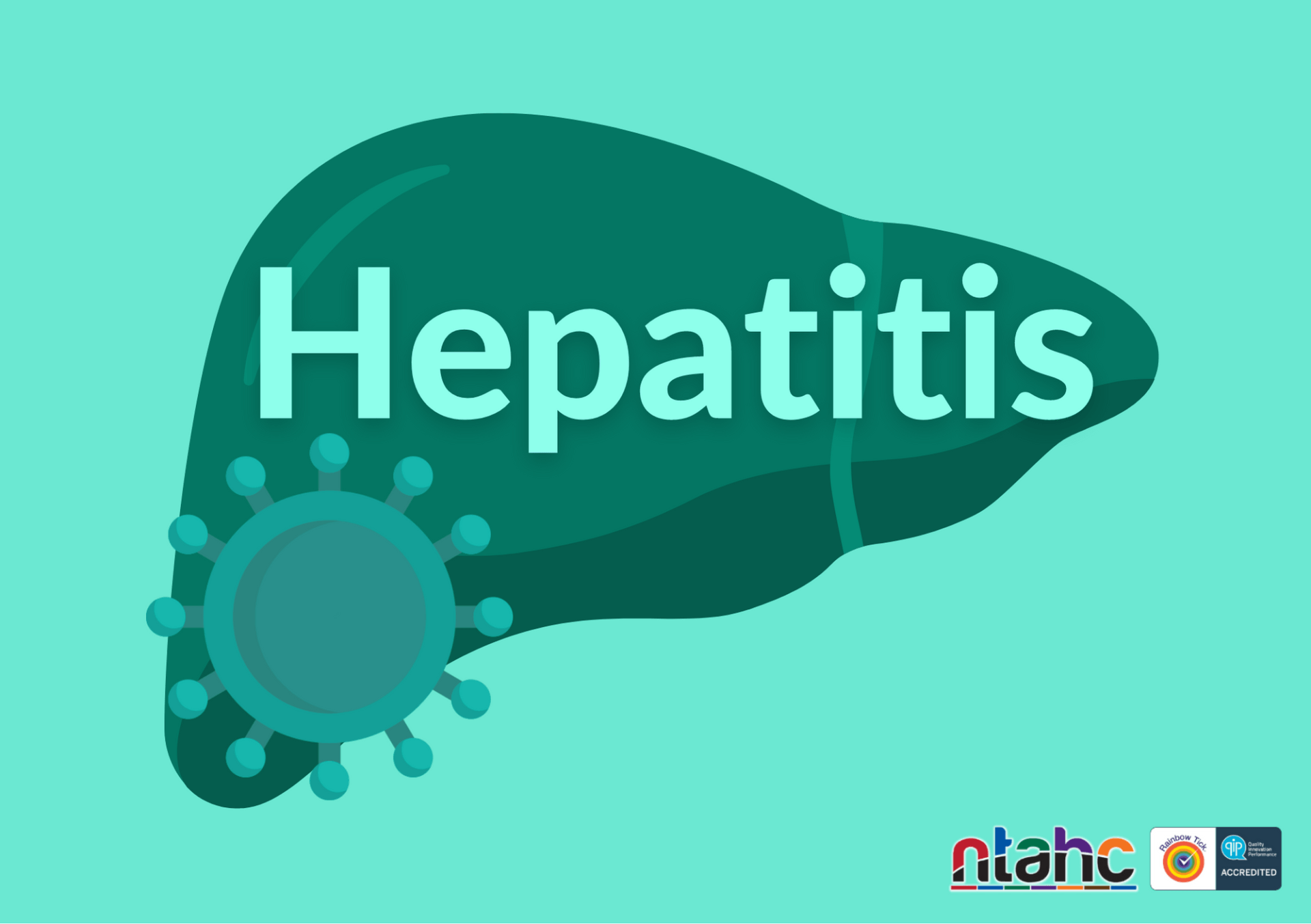Hepatitis A - B - C
Hep A B and C

Hepatitis C
Hepatitis is a general term used to describe inflammation of the liver. A variety of viruses and other substances, such as alcohol, can cause hepatitis. The hepatitis C virus causes viral hepatitis known as ‘hepatitis C’.
More information
- How someone can be infected
The hepatitis C virus is carried in the blood and is passed on when the blood of an infected person enters the bloodstream of another person.
It only takes a very small amount of infected blood to pass the virus on.
The most common way to get hepatitis C is by sharing injecting equipment with someone who is carrying the virus.
Other ways include:
through sporting and other activities where there is blood contact any blood contact before, during, or after a drug injecting episode using contaminated equipment for tattooing and body piercing using other people's personal items such as razors and toothbrushes for women who are hepatitis C positive, there is a small risk of transmission to their babies during pregnancy or birth blood transfusions overseas or in Australian before 1990.
Hepatitis C is not passed on by:
- kissing
- shaking hands
- coughing
- sharing household items that don't normally come into contact with blood
- living in a house with a person who has hepatitis C.
Hepatitis C can sometimes be transmitted during sex if there is blood contact.
- Symptoms
The first stage of infection (acute hepatitis C) is often mild, lasts less than six months and goes unnoticed in most people.
If symptoms occur, they may include:
- nausea
- dark urine
- tiredness
- abdominal discomfort.
- Jaundice (yellow colouring of skin and eyes) is rare in hepatitis C.
Hepatitis C is cleared from the body without medical intervention in about 25% of people within two to six months of being infected.
Most people who are infected with hepatitis C develop chronic infection where the virus remains in the blood and liver.
While hepatitis C can live in the body for years without causing symptoms, long-term infection may lead to liver damage.
As treatment is available that can cure the infection, it is important for people with chronic hepatitis C to go to a clinic for assessment.
- Prevention
There is no vaccine for hepatitis C and it is possible to become infected with hepatitis C more than once.
Antibodies produced by the body to fight the infection do not protect against further infections.
To avoid getting or passing on hepatitis C, reduce the risk of blood-to-blood contact by:
- never sharing injecting equipment and disposing of used equipment safely
- choosing a practitioner who consistently uses sterile equipment and standard infection control procedures for tattooing or piercing
- not sharing any personal items (razor, toothbrush, tweezers, scissors)
- disclosing your past practices and hepatitis C status when donating blood
- getting treated and cured so that you can't pass it on. Talk to NTAHC about our free clinic!
- Testing
Many people with hepatitis C do not know they are infected. It is important for people who are at risk to know their status by being tested.
The initial screening blood test looks for antibodies to the virus. Antibodies to Hepatitis C are usually present six weeks after infection but may take up to six months to develop.
A polymerase chain reaction (PCR) blood test looks for the presence of the virus in the blood.
Liver function tests are blood tests used to monitor the ongoing condition of the liver.
- Treatment
Hepatitis C is treated with new medications that specifically target the virus. They are called direct-acting antivirals (DAA). DAAs clear hepatitis C from the body.
There are now new oral tablet treatments available that can successfully cure more than 90% of people infected with hepatitis C.
These new medications are available and subsidised on the Australian Pharmaceutical Benefits Scheme.
They can be prescribed by specialists, general practitioners and nurse practitioners.
A typical course of these medications involves one to three tablets per day for eight to 12 weeks.
The tablets don't have the significant side effects that people had reported on treatment with older interferon or injection-based treatments.
Hepatitis B
Hepatitis is a general term used to describe inflammation of the liver.
Viruses are the most common cause of hepatitis. The hepatitis B virus causes hepatitis B infection and mainly affects the liver.
Other causes of hepatitis include:
- alcohol
- medication
- excess fats in the diet.
More information
- How is it spread
An infected person can transmit the hepatitis B virus to another person by blood, blood products, semen and vaginal fluids.
This can occur by direct injection or through breaks in the skin or via mucous membrane contact.
The virus can be spread:
- by sharing injecting equipment
- by vaginal, anal or oral sex without a condom
- from mother to baby at the time of birth or during pregnancy
- by contact between open sores or wounds
- by exposure to blood via shared tattooing equipment, acupuncture needles, nail clippers, razors and toothbrushes
- by accidental needle stick injury
- by blood transfusion (very rare in Australia).
- Symptoms
You may not have any symptoms. For people who do have symptoms, they generally develop two to three months after infection, but may develop from six weeks to six months after infection.
Symptoms may include:
- mild fever
- tiredness
- lack of appetite
- nausea
- vomiting
- abdominal pain
- muscle and joint pain
- a rash
- dark urine
- a change in colour of faeces (pale poo)
- yellowing of the eyes and skin (known as jaundice).
Skin change may be difficult to see in dark skinned people.
The symptoms and signs are generally more severe in adults than children. Many children will have no symptoms or mild symptoms only.
- Prevention
Hepatitis B can be prevented by:
- vaccination (vaccination of all infants at birth is now recommended)
- administering hepatitis B immunoglobulin at birth to all babies of mothers who have chronic hepatitis B and giving medication to pregnant women at especially high risk of passing on the virus
- never sharing injecting drug equipment
- wearing protective gloves, clothing and face shield when handling blood or body fluids
- practicing safer sex
- not sharing personal items such as razors and toothbrushes
- having any tattooing/body piercing performed by a registered tattooist/beautician.
- Vacination
There are several types of hepatitis B vaccine available in Australia including combination vaccines.
Since 1990 all children have been offered the vaccine at birth, two, four and six months of age as part of the National Immunisation Program.
Vaccination is recommended for non-vaccinated people who are:
- household and sexual contacts of a person with hepatitis B
- injecting drug users
- haemodialysis and renal transplant patients
- regular recipients of blood products
- hepatitis C antibody positive and/or have chronic liver disease
- HIV positive or are immunocompromised
- men who have sex with men
- migrants from countries where hepatitis b is prevalent
- sex industry workers
- residents and staff of facilities for persons with intellectual disabilities
- inmates and staff of long term correctional facilities
- health care workers and embalmers.
Hepatitis B vaccine for adults is usually self or employer funded. Pre and post vaccination blood tests are only recommended for certain groups.
Booster doses are generally not recommended. Talk to your general practitioner (GP) or health provider.
- Treatment
People with acute hepatitis B don't usually require specific treatment.
Some people with chronic hepatitis B require treatment to prevent damage to the liver and reduce the risk of liver cancer.
This also reduces the chance of infecting other people. Treatment consists of tablet medication that is well tolerated with few side effects but needs to be taken long term.
All people infected with chronic hepatitis B require lifelong follow-up.
Hepatitis A
Hepatitis is a general term used to describe inflammation of the liver. A variety of viruses and other substances, such as alcohol, can also cause hepatitis.
The hepatitis A virus is the most common virus that causes hepatitis.
More information
- How is it spread
This virus passes through the digestive system of people with the infection and is spread when something contaminated with infected faeces is swallowed. Only a small amount of virus is necessary to spread the infection.
The virus can potentially survive on objects and in water for months.
The virus can be passed on:
- by food, drink, eating utensils, toys or other objects that have been handled by an infected person
- after touching infected nappies, linen and towels or someone else’s hands that have been in contact with faeces
- by oro-anal sex.
Outbreaks have also been reported as a result of drinking or bathing in water contaminated by sewage, or by eating shellfish, particularly oysters contaminated by sewage.
- Symptoms
The symptoms generally develop between two weeks and two months after infection. You will most commonly see symptoms one month after infection.
Hepatitis A is an acute illness. Symptoms include:
- fever
- loss of appetite
- nausea
- tiredness
- abdominal discomfort
- feeling generally unwell.
Urine may become dark in colour and poo, also known as faeces, may become pale.
Eyes and skin may become yellow (known as jaundice). Skin change is often difficult to see in dark skinned people. The skin may become itchy.
The symptoms are generally more severe in adults than children with a variable length and severity of illness. Complications are rare and most people will feel well again within a month.
Often children will not show any sign of the infection or have a mild illness without any jaundice.
Hepatitis A does not cause chronic liver disease and people do not become ‘carriers’, as can occur with hepatitis B or C.
After a person has recovered from hepatitis A they are immune and can't get it again.
- Prevention
Good hygiene is the best way to prevent hepatitis A. In situations where good hygiene may be compromised hepatitis A vaccination is recommended.
To avoid spreading the virus you should wash your hands thoroughly with soap and warm running water for at least 10-15 seconds. Hands should be thoroughly dried with clean paper towel. You should wash and dry your hands:
- before eating
- after going to the toilet
- before preparing or handling food
- after handling objects that may have been contaminated with body fluids, such as nappies and condoms.
Other measures to avoid infecting others include:
- don't share drinks and eating utensils
- don't prepare food or drink for other people
- wash eating utensils in warm soapy water and machine wash all linen and towels
- don't share linen and towels with other people
- don't have sex
- clean floors and toilets regularly (including toilet door handles)
- don't change nappies or let children sit on tables or counters where food is prepared or eaten
- wash change mats with warm soapy water (use disposable wash cloth or launder cloth after use)
- clean books, toys, equipment, furnishings
- Vacination
Hepatitis A vaccine is available for both adults and children and is safe and effective in preventing disease.
Vaccination is recommended for people in the following at risk groups:
- travellers to countries where Hepatitis A is common
- Aboriginal and Torres Strait Islander children living in the Northern Territory (NT)
- people who live and work in remote Aboriginal and Torres Strait Islander communities in the NT
- child care and preschool workers
- persons with developmental disabilities and their carers
- health care providers in the NT
- men who have sex with men
- injecting drug users
- people with chronic hepatitis B and C infections
- people with chronic liver disease
- solid organ transplant recipients
- plumbers and sewage workers
- people who are inmates of correctional facilities.
A pre-vaccination blood test to determine existing immunity is not routinely recommended. However, the following groups of people should be screened for natural immunity to hepatitis A to avoid unnecessary vaccination:
- people born before 1950
- people who grew up in areas with intermediate/high risk of hepatitis A infection such as Indigenous communities or countries in Africa and Asia
- people with a previous episode of hepatitis or jaundice.










